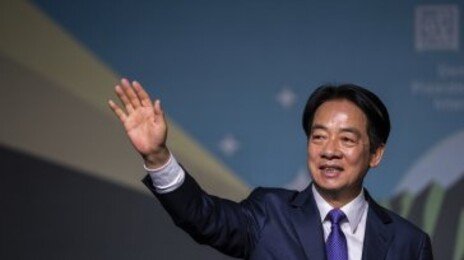
필자가 이미 본란(5월 13일자 세계의 눈)에서 지적한 대로 동북아시아의 2005년은 절호의 기회를 맞을 수도, 미묘한 위기를 맞을 수도 있다.
중국에서는 후진타오(胡錦濤) 국가주석이 중앙군사위원회 주석직까지 장악하면서 명실상부한 ‘후진타오 체제’가 출범했다.
일본에서는 고이즈미 준이치로(小泉純一郞) 총리가 부시 행정부와 긴밀한 협력 체제를 갖추면서 2006년까지 순항할 것으로 보인다. 물론 이라크 파병 자위대에 사고가 생기지 않아야 한다. 블라디미르 푸틴 러시아 대통령도 건재하다.
부시 대통령의 재선을 감안한다면 동북아지역에 이처럼 정치적 안정구도가 형성된 것은 근래 들어 없던 일이다.
2005년 상반기는 새 행정부 출범과 함께 인사 개편으로 복잡할 수 있지만, 하반기는 전략적으로 의미 있는 시점이 될 것이다.
이라크에서는 위험한 군사적 대치가 계속되는 한편 1월에는 총선이 치러진다. 이란의 핵개발 프로그램도 계속될 전망이다. 미국이 전략적 관심을 동북아에 붙들어 두기 어렵다. 물론 6자회담을 둘러싼 북한의 막무가내는 계속될 것이다.
그러나 중반기에 접어들어 부시 행정부가 중동정책에 성공한다면 상황은 급변할 수 있다. 이란과 이라크의 위기 국면이 안정되면 미국은 정치 군사적 영향력을 동북아에 집중할 것이다. 북한의 핵무기 화학무기 생물학무기 프로그램 가동 문제나 국제 테러조직과의 연계 가능성은 그냥 무시해 버리기엔 심각한 사안들이기 때문이다.
그렇다면 2기 부시 행정부는 북한 핵문제와 6자회담을 어떤 방식으로 접근할까.
첫째, 미국의 대응은 북한의 태도에 달려 있다. 북한이 핵실험을 하거나, 국제 테러조직과 접촉하거나, 이란의 핵개발 프로그램을 돕는다면 미국은 북한을 신속하고 심각하게 다룰 공산이 크다. 북한이 잠자코 있으면 중동이 안정될 때까지 미국은 북핵 프로그램 존재를 애써 무시하는 전략을 쓸 수 있다.
둘째, 부시 행정부가 협상 과정에서 채찍을 들 수 있다. 미국은 절대 군사력 사용 가능성을 접어두지 않을 것이며, 압박외교 과정에서 호전적인 위협이 나올 수 있다. 물론 부시 행정부는 군사행동에 들어갔을 때 서울이 겪게 될 엄청난 피해를 잘 알고 있다. 따라서 압박외교는 북한산 마약, 밀수품 등의 통관을 막는 엄격한 해상봉쇄부터 시작될 것 같다.
셋째, 북한에 당근을 제공하는 방법도 생각할 수 있다. 1950년 한국전쟁 이후 미국은 동북아에서 경제적 이익보다는 소련 봉쇄라는 안보상 이익을 추구해 왔다. 이처럼 경제보다 안보이익을 우선시하는 비대칭 구조 때문에 남북한 모두 경제 체질의 변화가 억제돼 왔다.
북핵과 6자회담은 이런 구도를 바꿀 수 있는 효과적 지렛대가 될 수 있다. 부시 행정부가 에너지 인프라 구축 등 동북아 지역개발 프로그램을 가동하면 변화가 가능하다. 이런 노력이 미국의 에너지산업, 건설사, 월가의 이해와 맞아떨어질 때 성공 가능성은 더 커진다.
부시 행정부가 지역안보 유지라는 틀 안에서 동북아지역의 평화와 번영을 향해 큰 발을 내딛는다면 엄청난 성과를 낼 수 있고 부시 대통령에게 2005년은 영광의 해가 될 수 있다.
켄트 콜더 존스홉킨스대 교수·동아시아연구소장
GEORGE BUSH’S GOLDEN YEAR
By
Kent E. Calder
Director, Reischauer Center for East Asian Studies
SAIS/Johns Hopkins University
Washington, D.C.
George W. Bush’s November 2 re?election victory in the U.S. Presidential election was more substantial than many expected. Although Bush’s margin was narrow in key states like Ohio and Florida, nationally it exceeded three million votes, on a high popular turnout total of 112 million that had been expected to help Democratic candidate John Kerry. Bush’s substantial 40 percent of the Hispanic vote was especially striking. With third?party candidate Ralph Nader attracting only negligible support, Bush was able to achieve the first popular?vote majority in sixteen years in an American Presidential election.
Congress also moved further to the right. Although Republican gains in the House of Representatives were minimal, in the Senate the GOP gained four seats, to achieve a stable Senate majority of 55. President Bush’s short?term leverage was further enhanced by the personal defeat of Democratic Senate Minority Leader Tom Daschle in South Dakota―the first time that a Senate party leader has been defeated since 1952.
So a re?elected President George W. Bush has four predictable years in office ahead of him, and a significantly stronger domestic political mandate than four years ago. Re?elected American presidents have historically found their fifth year in office―the period confronting Bush now―to be their most fruitful opportunity to achieve really historic change―both at home and abroad.
In Northeast Asia, as I have previously argued in these pages, 2005 presents a historic opportunity, albeit a subtle and potentially dangerous one. The Hu Jin Tao administration has just been consolidated in China, with Jiang Zhi Min recently retiring from his last major governmental post, on the Central Military Commission, and Hu succeeding him. In Japan, Koizumi:s government, which has collaborated closely with Bush, appears stable until 2006, unless disrupted by major casualties in Iraq. Putin also appears stable in Russia. When Bush’s re?election is also factored in, there is a rare prospect of political stability, and secure leadership tenure impending among the great powers of Northeast Asia, for at least the coming two years.
2005―especially the second half of the year―is likely to be especially strategic. The first half will be complicated, particularly in the American foreign?policy process, by personnel changes at the top, including possibly at both the State Department and the National Security Council. January elections in Iraq, the volatile military situation there, and the Iranian nuclear program, will also likely divert serious American attention away from Northeast Asia early in the year, as will the bombastic North Korean preliminary approach to negotiations.
By mid?year, however, the dynamics could change significantly, especially if the Bush Administration is successful in its approach to the Middle East. When the Iraqi and Iranian situations stabilize, the U.S. will have substantially more political?military leverage in Northeast Asia, and is likely to turn its attention there. The North Korean nuclear, chemical, and biological programs, and the potential for linkages to global terrorism, are simply too substantial, in its continuing view, to be ignored.
Then how might the re?elected Bush Administration likely approach Northeast Asian issues―particularly the North Korean nuclear question and the six?party talks―in 2005? Three observations are in order. First, its incentives to seriously address Northeast Asian issues at all are not fixed. If North Korea tests a nuclear weapon, interacts seriously with terrorists, or substantially aids Iranian strategic programs, U.S. incentives to deal swiftly and severely with North Korea would be strong. Otherwise it may prefer to wait―and to effectively ignore the DPRK, as it has often done in the past, until its own Middle East problems are more manageable.
A second important dimension is the coercive aspect of the Bush Administration’s strategy―its stick, in bargaining parlance. Given American military credibility, the Bush Administration seems unlikely to foreswear the implicit leverage that such credibility provides. It may well thus make belligerent threats, as an aspect of coercive diplomacy. Yet the Administration, like any serious policymaker in DC, is well aware of the destruction that an actual war would wreak on today’s Seoul. The core of its serious coercive diplomacy, if required, is thus likely to be a stiff embargo, beginning with tough measures against drugs, contraband, and other illegal activities of economic importance to the North, rather than military action. Many in the Bush Administration would no doubt be happy to see the North collapse, but most see actual conflict to achieve this as an absolute last resort.
This brings us to the third and in many ways most crucial aspect of the 2005 situation: the “carrot”. Since the outbreak of the Korean War in 1950, the US has continuously had strong security interests in Northeast Asia, centering on distinctly limited economic concerns apart from assuring South Korea’s stable, sustained economic growth. This skewed profile of national interests has powerfully inhibited American interest in basic economic change on the Korean peninsula.
The nuclear issue and the six?party talks could be a powerful level for changing all this, and for committing the Bush Administration to broad?based Northeast Asian economic development. Obviously, North Korea would have to give up its nuclear program. But in return the Bush Administration might well commit to a broad program of Northeast Asian development, centering on energy infrastructure, especially if it provided substantial benefits for American energy, construction, private?equity and investment?banking firms. Substantial steps toward regional peace and prosperity in Northeast Asia could, if the security context is right, ultimately be a major achievement of George W. Bush’s Golden Year.
|
세계의 눈
구독-

고양이 눈
구독
-

영감 한 스푼
구독
-

오늘의 운세
구독
-
- 좋아요
- 0개
-
- 슬퍼요
- 0개
-
- 화나요
- 0개
-
- 추천해요
- 개
지금 뜨는 뉴스
-

런던베이글·성심당서 쓰는 ‘가루쌀’ 알고 보니…여기서 만든다고?
- 좋아요 개
- 코멘트 개
-

“명문대 나온 부모들, 아이도 보내고 싶죠? 그 마음 버려야 합니다”
- 좋아요 개
- 코멘트 개
-

정부, 라이칭더 대만 총통 취임식에 대표단 파견 안한다
- 좋아요 개
- 코멘트 개
![[세계의 눈/스인훙]흔들리는 美권위](https://image.donga.com/donga_v1/images/img_default.png)
댓글 0